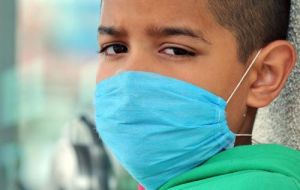MercoPress. South Atlantic News Agency
A/H1N1 virus “unstoppable”; vaccine access a “political question”
 WHO says most H1N1 cases are mild, with many people recovering unaided.
WHO says most H1N1 cases are mild, with many people recovering unaided. The United Nations top health official opened a forum in Mexico on combating the A/H1N1 flu saying that the spread of the virus worldwide is now “unstoppable”. World Health Organization head Margaret Chan added that the holding of the meeting in Cancun showed confidence in Mexico, which has been hard hit.
Representatives and experts from over 50 countries met in Mexico to address the flu pandemic and the elaboration of vaccines.
WHO says most H1N1 cases are mild, with many people recovering unaided. As the peak of the flu season approaches in South America, some areas have declared a public health emergency. El Salvador reported its first death from swine flu, a day after Paraguay reported its first fatality. Meanwhile Argentina which seems to be the country hardest hit by the virus reported “at least 44 deaths and 100.000 cases”.
“As we see today, with well over 100 countries reporting cases, once a fully fit pandemic virus emerges, its further international spread is unstoppable,” Dr Chan said.
She stressed that the overwhelming majority of patients experienced mild symptoms and made a full recovery within a week, often in the absence of any form of medical treatment.
The exceptions, she said, were pregnant women and people with underlying health problems, who were at higher risk from complications from the virus and should be monitored if they fell ill.
“For a pandemic of moderate severity, this is one of our greatest challenges: helping people to understand when they do not need to worry, and when they do need to seek urgent care,” Dr Chan said.
Turning to the summit venue, the WHO chief added: “Mexico is a safe, as well as a beautiful and warmly gracious, place to visit.”
Leaders and experts from 50 countries are in Cancun for the two-day meeting to discuss strategies for combating the virus.
It has been more than two months since the initial alert over the flu. Since then, the H1N1 virus has entered more than 100 countries, infected more than 89.900 people and killed more than 380 worldwide.
Authorities across South America are becoming increasingly concerned as the peak flu season approaches. Schools across Argentina have sent students home and pregnant women have been told they can take two weeks off work to avoid contracting the virus.
Access to a future A/H1N1 vaccine was a central theme of the summit’s debate. WHO Assistant director-general Keiji Fukuda said the flu vaccines remains a “critical question” particularly guaranteeing the vaccine is distributed to underdeveloped nations will require “political goodwill.”
“One of the important results of the summit was that we recognized that we face technical problems, but also problems of political will,” Fukuda said.
Cuauhtemoc Ruiz, coordinator for the Pan-American Health Organization, said the vaccine is likely to be available in “three or four months,” but it could be up to a year before “sufficient quantities” are produced.
The laboratories working to produce the vaccine, he said, can make 2.5 billion doses in six months. Dr. Chan said laboratories are looking at various possibilities, including creating a vaccine by adding a new component to the existing vaccine used for seasonal flu. If it works, the method could triple production.
But there are fears that most of the stock that will be produced has already been reserved by the United States and European countries.




Top Comments
Disclaimer & comment rulesCommenting for this story is now closed.
If you have a Facebook account, become a fan and comment on our Facebook Page!